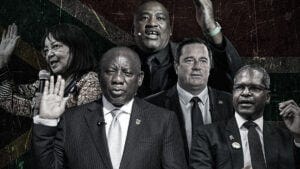One Year Later: The GNU That Wasn’t
The Government of National Unity has revealed itself to be neither truly national nor unified — a political arrangement sustained by mutual convenience rather than shared vision.
It has been a year since Cyril Ramaphosa was inaugurated for a second term as President of South Africa, this time at the helm of a so-called Government of National Unity. The GNU was marketed as a bold experiment in multiparty cooperation, a historic response to the ANC’s loss of its parliamentary majority. But twelve months in, the grand political project has resolved into something far less inspiring, a tenuous arrangement built more on mutual avoidance than shared purpose.
What emerged in June 2024 was not a GNU in any meaningful sense of the term. It was, instead, a strategic sleight of hand. Faced with a hostile opposition in the EFF and MK Party, and increasingly encircled by dissent within his own party, particularly from the Mashatile-aligned faction, President Ramaphosa turned to the DA. But a direct alliance with the DA carried reputational risks. The enduring spectre of racialised politics would have made such a move look like a betrayal to the ANC’s traditional base. Ramaphosa needed the DA, but he could not be seen to need them. Thus, the GNU was born, a political construct designed to obscure the fact that this was, fundamentally, a coalition with the DA.
It was a clever formula. Surround the DA with smaller, more pliant parties, co-opted into the GNU with promises of portfolios and prestige, and dilute their influence. Even the size of the Cabinet, expanded without consultation, was part of this strategy. It allowed the ANC to reward loyalists, crowd out the DA, and maintain dominance under the guise of unity.
For the DA, the prize was power, or so it seemed. The party entered negotiations not obsessed with how many Cabinet seats it would get, but with Clause 19, a provision that promised real co-governance on policy. That clause, had it been honoured, would have given the DA a seat at the table in shaping the country’s economic direction. But from the start, the ANC had no real interest in power-sharing. It banked, correctly, on the DA’s internal pressures to remain in government and the improbability that it would walk away from its new executive status.
This misalignment of intention came to a head during the budget standoff. Clause 19 faded into irrelevance once the ANC realised it could pass legislation without the DA, if it could find alternative support. That Monday night shift from an informal agreement with the DA to a desperate deal with ASA was a turning point. The ANC had miscalculated. The budget fell through. And in the end, it was Finance Minister Enoch Godongwana’s third budget, tempered by the DA’s demands, that saved the day. Not because the ANC welcomed DA influence, but because it had no better option.
Yet in that crisis, the truth of the GNU was laid bare. Not just to the public, but to its architects. In the ANC, indignation brewed that the DA dared to “defy” the ruling party. In the DA, the penny dropped. The GNU was not a mechanism for coalition governance. It was a stage-managed performance with no script for shared power.
And yet, no one left. Why?
For the ANC, ejecting the DA would leave only the MK Party and the EFF as alternatives, both politically unpalatable and ideologically incompatible. Moreover, the DA was not, in practice, obstructing the ANC’s broader policy agenda. For the DA, the reasons were more fragmented. Some wanted to remain as a kind of “internal opposition,” others enjoyed the prestige and salary of executive office, while a committed group genuinely believed they could push through meaningful reforms in their limited portfolios. Most significantly, polling data suggested their voters wanted them to stay.
But in choosing to stay, the DA relinquished its final leverage. Clause 19 was effectively dead. The DA could continue reforming within its ministries, but the broader economic direction of the country would remain in ANC hands. Co-ownership of the national agenda had become a myth.
So what are we left with?
A hybrid formation, neither a government of national unity nor a traditional coalition. It is, at best, an executive fragmentation, a government that governs together selectively, votes together sometimes, and sues itself when necessary. A parliament within a parliament.
There are short-term political upsides. The DA, if astute, can use its position to court new voters and expand its base. The ANC retains control both within government and its internal structures. Both parties have managed to avoid the cataclysm of governance with the EFF or MK. But the cost is steep. For South Africa, the GNU has not been a catalyst for renewal. It has not turned the economy around. It has not arrested the downward spiral of literacy, employment, or public safety. Eight million remain unemployed. Twenty thousand are murdered each year. Our education system is in crisis.
Doing the right thing politically is necessary. But it is not sufficient. The DA cannot simply say it kept the Titanic from sinking faster. It must be able to say it changed course entirely. Unless it finds a way to drive real economic reform, the party will emerge from this experiment politically intact but morally and strategically diminished.
For the ANC, there is no such reckoning yet. But the GNU has not solved the ANC’s problem, which is, ultimately, the ANC itself, an increasingly fragmented movement clinging to power while the country drifts.
One year in, the GNU stands not as a symbol of political maturity, but as an emblem of stasis. A government that isn’t collapsing, but isn’t delivering either. One that doesn’t inspire confidence, but just enough stability to keep the wheels turning. That is not good enough.
Not for a country in crisis.



